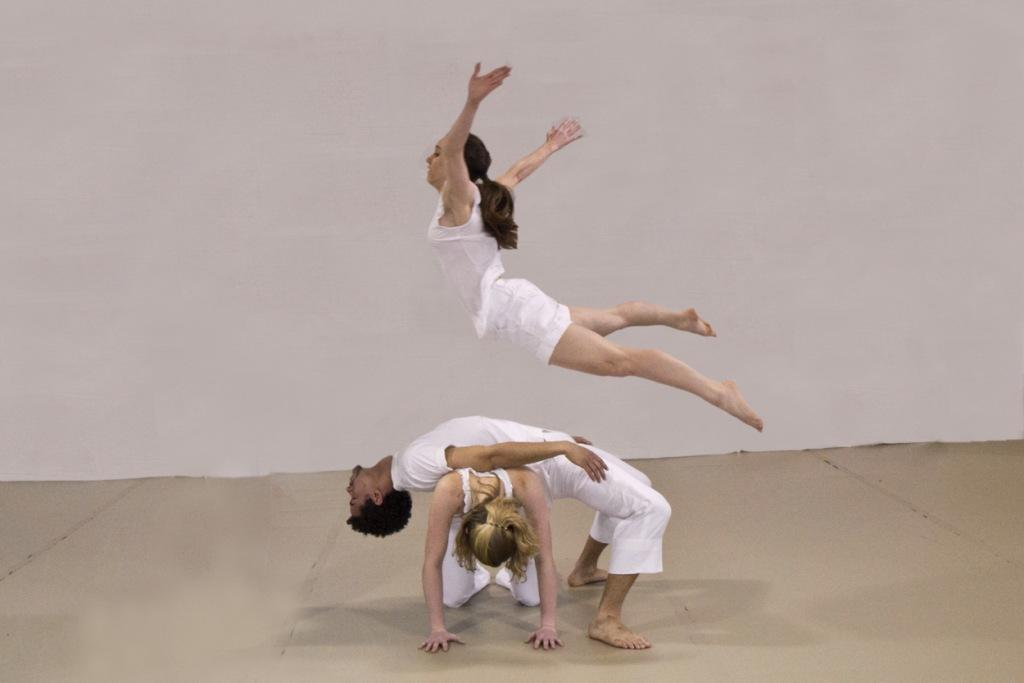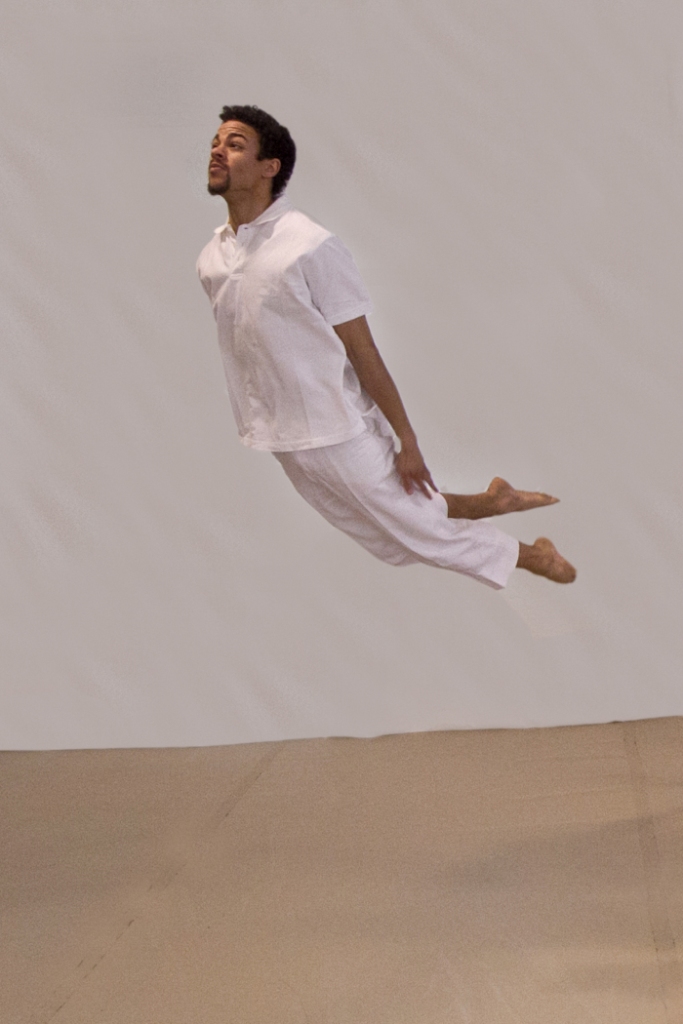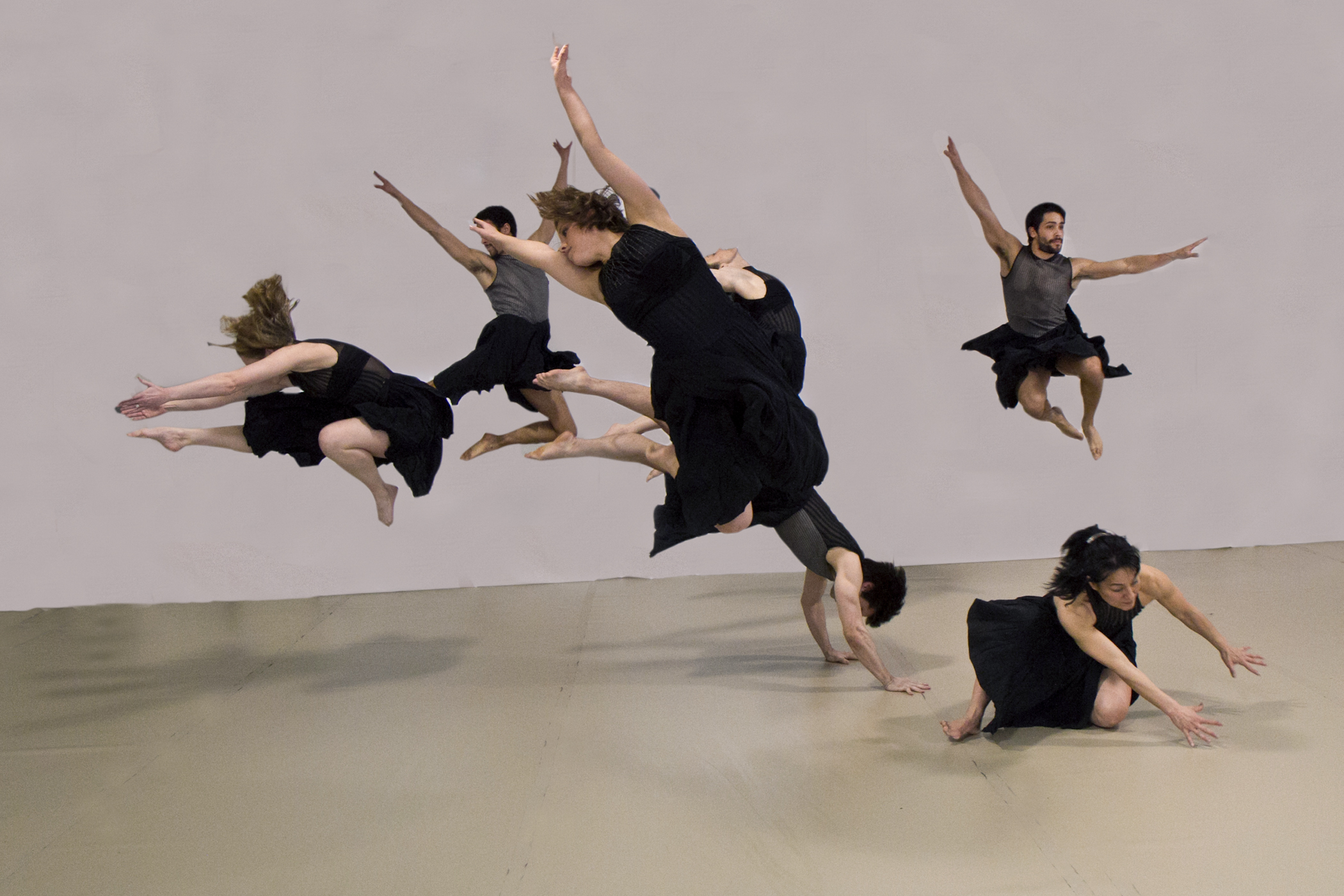A Maelstrom of Human Energy
Lightsey Darst reviews Black Label Movement's recent concert at the Cowles Center, "Visceral," describing the show as intensely physical, with dark psychological undertones -- mesmerizing and exhausting.



BLACK LABEL MOVEMENT‘S CONCERT AT THE COWLES CENTER, Visceral, Carl Flink’s “Hit”: four superheroes (Bryan Godbout, Megan McClellan, Eddie Oroyan, and Laura Selle Virtucio) pound on each other. Selle Virtucio, monumental, pissed off, punches Godbout. Oroyan slaps McClellan. Partnering turns into gladiatorial combat; impact’s audible. Two face off; when they part they’re bolstered by their seconds and turned back like tired fighters into the ring. “Come on, Eddie!” the others shout, catcalling until Oroyan hurls himself at them. Any caress will come with a kick. I wince, I twitch. I didn’t come to see this: daredevil McClellan leaping people like Evel Knievel leaping buses, circling the stage, revving up to do it again. I’m being implicated in a desire that isn’t mine. These jumps that nearly don’t catch — Selle Virtucio flying leapfrog over Godbout to land on Oroyan, almost taking him to the ground, the audience gasping — they do thrill, but it’s the loft I like, not the risk. Of course loft and fall are inseparable, and Flink makes the cost of flight clear, I’ll give him that. I have to admit, too, that when the dance briefly lulls, my mind wanders. But is that taste for blood mine, or did Flink bring it out? Can you bring out what isn’t there to begin with? Everything the dancers do can’t work, can’t hold. The natural ending is an execution. Instead things fall apart.
“Canary”: I have no idea what this dance might be about until the dancers, still dark, start singing about mining. Of course: it’s going to be about coal in the same way Flink’s 2006 Wreck was about Great Lakes shipping, a paean to rough work. Then the lights go up on the dancers in prom gear, all — you guessed it — canary yellow. So it’s …what? A prom in a coal town? Prom as metaphor for coal mining? Coal mining as metaphor for prom? Neither, it turns out. Hard driving music (the work of Greg Brosofske) kicks in and the dancers plunge into attitudinal stutters, voguish arms, mad ragdoll slumps. Mostly, I don’t find Flink a movement inventor — all his moves look a little familiar — but this stuff ricochets with the sick, last-night tang of the cold that’s been going around that you finally get. Not that that’s a criticism of “Canary” itself, because this weirdly unhinged piece turns out to be more about dance than anything else: pairs of dancers manipulate others with pointing fingers, like puppeteers. Are they choreographers? Final image: everyone lies prostrate around magnificent McClellan, who, like a goddess idly obliging her followers with a show of power, summons this one, that one, all of them into full-body jumps like electroshock. Is this wild mélange about choreographic exhaustion?
But since when do I care about about? Flink keeps leading me into the dark of his psychology, where, on the evidence of “Canary” and “Hit,” a powerful anger lurks under a dull ennui. Perhaps that’s me I’m talking about — I know it must be, I know that’s how this psychology business works. But after the whole concert — “Hit” and “Canary” plus a duet from Wreck plus the agonized and claustrophobic solo “For She” plus 2001’s “This Bleeding Heart…” (which, tossed onto the end of the concert, mostly reveals how Flink has become a deeper and subtler creator in ten years) plus — I almost forgot it because it’s so whimsical it practically blows itself off stage — the TED talk “A Modest Proposal,” in which a winning science guy (John Bohannon) breezes through some numbers, dancers as frenzied atoms … what was I saying? Oh yes, I’m exhausted. My mirror neurons were spent by the time Flink came out with the klieg light to flatten his last two dancers into the light/dark (you know it’s all the same). And maybe that’s realistic, that I should be exhausted, that I should also pay in energy — but no one seems to want to hear that word now, realistic…
What are you doing, Carl? I’m curious and I care. Maybe another week of dreams will clarify it for me. But, right now, I’m stuck in the sludge, soaked in sympathetic lactic acid, bruised in the organ of perception.
Anyway, I can talk about the dancing at least. Does anyone else stand the way Laura Selle Virtucio does? More than any other dancer in town, she brings home that phrase “life of the body,” arguing with every cell for the primacy of the physical self, the immediacy of this moment you’re in. (Feel it? Get up, goddamn you.) Or Megan McClellan: a few years ago, I thought she was lapsing into her acting ability, sketching in moves she didn’t care to inhabit, but that woman’s put in some serious work, and if you want to see the raw edge of motion, McClellan’s in a rare class (with Minnesota Dance Theatre’s Melanie Verna) — a mover who begins at the atomic level. Bryan Godbout’s mellowed out in a good way; he still jumps like an animal, but now with a sense of human cost. Eddie Oroyan is a Homeric hero; I was going to say “looks like,” but the heck with that, he’s epic; I could watch him catch, throw, leap, land, fall, almighty but gracefully feathering his strength into soundlessness, for hours. And the supporting cast: I don’t know all their names, but they dance like I ought to. Actually, they scare me a little. That maelstrom of human energy pouring off stage: Are they a mob or a riot, a cult or a revolution?
______________________________________________________
______________________________________________________
Noted event information:
Black Label Movement’s concert, Visceral, was on stage February 10-12 at the Cowles Center in Minneapolis.
______________________________________________________
About the author: Originally from Tallahassee, Lightsey Darst is a poet, dance writer, and adjunct instructor at various Twin Cities colleges. Her manuscript Find the Girl was recently published by Coffee House; she has also been awarded a 2007 NEA Fellowship.